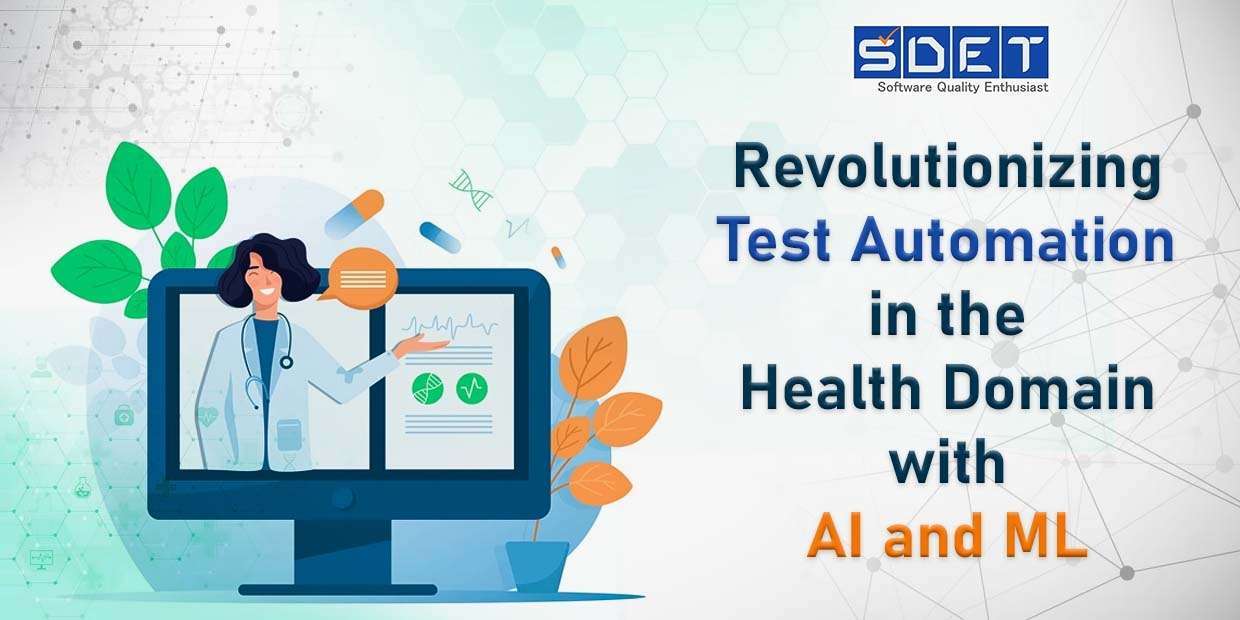
Revolutionizing Test Automation in the Health Domain with AI and ML
The health domain is witnessing an extraordinary transformation, driven by technological advancements. Among these, the integration of Artificial Intelligence (AI) and Machine Learning (ML) is revolutionizing various aspects of healthcare, including test automation development services. In this blog, we explore how AI and ML are reshaping test automation in the health domain, enhancing efficiency, accuracy, and patient care.
The Evolving Landscape of Healthcare
The healthcare industry is becoming increasingly data-centric. Electronic Health Records (EHRs), telemedicine, wearable devices, and other digital technologies have generated vast amounts of data. However, these developments have also created complex challenges, including the need for accurate and efficient testing of healthcare software and systems.
Test Automation in Healthcare
Test automation is the process of using automated tools and scripts to perform tests on software applications. In the health domain, it is essential to ensure the reliability and safety of healthcare software, such as Electronic Health Record (EHR) systems, telemedicine platforms, diagnostic applications, and more.
Challenges in Healthcare Test Automation
Healthcare software requires rigorous testing due to the critical nature of patient care. Traditional test automation methods are time-consuming and may not adequately cover the complexity of healthcare systems. Some of the challenges include:
- Interoperability Testing: Healthcare software often needs to interact with various devices, systems, and data sources. Ensuring interoperability through manual testing can be arduous.
- Complex Data Testing: Validating the accuracy and security of complex medical data is labor-intensive and prone to human error.
- Regulatory Compliance: The health domain is subject to strict regulations and compliance requirements. Ensuring that healthcare software complies with these regulations can be challenging.
- Real-World Scenario Testing: Healthcare systems must be tested in real-world scenarios, which are diverse and unpredictable, making manual testing less effective.
- Efficiency and Cost: Manual testing can be costly and time-consuming, impacting the speed at which healthcare software can be developed and deployed.
AI and ML in Healthcare Test Automation
AI and ML are addressing these challenges by introducing automation and intelligence into healthcare testing:
- Data-Driven Testing: ML algorithms can analyze massive datasets to identify patterns and anomalies, making data testing more efficient and accurate.
- Predictive Testing: AI can predict potential issues in the software by analyzing historical data and test results. This proactive approach helps prevent critical failures.
- Interoperability Testing: ML models can simulate the interactions between healthcare systems and devices, allowing for efficient and comprehensive interoperability testing.
- Regulatory Compliance: AI can assist in ensuring compliance by continuously monitoring healthcare software and providing alerts for potential violations.
- Test Case Generation: ML can generate test cases based on real-world scenarios and data, reducing the need for manual test case creation.
- Efficiency and Cost Reduction: By automating routine and time-consuming tasks, AI and ML reduce testing time and costs, accelerating the development and deployment of healthcare software.
Benefits of AI and ML Driven Test Automation in Healthcare
The application of AI and ML in healthcare test automation services brings several notable benefits:
- Improved Accuracy: AI-driven testing ensures a higher level of accuracy, reducing the risk of errors in healthcare software that could jeopardize patient safety.
- Cost Savings: Automation reduces testing time and labor costs, enabling healthcare organizations to allocate resources more effectively.
- Predictive Maintenance: AI can predict when software or devices require maintenance or updates, preventing unexpected failures.
- Enhanced Security: AI and ML can continuously monitor for security vulnerabilities, protecting patient data from potential breaches.
- Faster Deployment: With automation, healthcare software can be tested more rapidly, allowing for quicker deployment and updates.
- Real-Time Monitoring: ML models can provide real-time monitoring of healthcare systems, ensuring optimal performance.
Challenges of Implementing AI and ML in Healthcare Test Automation
While AI and ML hold immense promise in healthcare test automation, their implementation is not without challenges. Some of these challenges include:
- Data Privacy: Healthcare data is sensitive and protected by strict privacy regulations. Ensuring data privacy is a critical concern when implementing AI and ML.
- Training and Integration: Healthcare professionals and IT staff may require training to effectively use AI-driven testing tools. Additionally, integrating AI into existing systems can be complex.
- Regulatory Hurdles: Regulatory bodies may need to adapt to the use of AI and ML in healthcare, which can pose challenges for implementation.
- Ethical Concerns: The use of AI in healthcare testing may raise ethical questions, such as the potential for bias in ML models and patient consent.
Conclusion:
AI and ML are revolutionizing healthcare test automation by improving efficiency, accuracy, and patient care. The integration of these technologies not only addresses the challenges in healthcare software testing but also offers a multitude of benefits, from cost savings to enhanced security. However, the implementation of AI and ML in healthcare must be carefully managed to navigate data privacy concerns, regulatory compliance, and ethical considerations. With the right approach, AI and ML are poised to transform the healthcare industry for the better, ultimately ensuring that patients receive safer and more efficient care.
